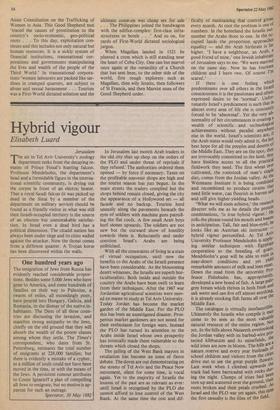Hybrid vigour
Elisabeth Luard
Jerusalem The air in Tel Aviv University's zoology department reeks from the decaying re- mains of Prince Feisal's hunting falcon, Professor Mendelsohn, the department's head and a formidable figure in the interna- tional scientific community, is drying out the corpse in front of an electric heater. That a royal Saudi falcon (it was picked up dead in the Sinai by a member of the department on military service) should be found as a friendly visitor in what was still then Israeli-occupied territory is the source of an obscure but unmistakable satisfac- tion. In Israel even a dead bird has a political dimension. The citadel nation has always been under siege and its cities walled against the attacker. Now the threat comes from a different quarter. A Trojan horse has been discovered within the walls.
In Jerusalem last month Arab traders in the old city shut up shop on the orders of the PLO and under threat of reprisals if they refused: The authorities ordered them opened — by force if necessary. Taxes on the profitable souvenir shops are high and the tourist season has just begun. In the main streets the traders complied but the shops behind remain closed, giving the city the appearance of a Hollywood set — all facade and no backup. Tourists herd uneasily along the pavements beneath the eyes of soldiers with machine guns patroll- ing the flat roofs. A few small Arab boys hurl stones upwards. The soldiers are not new but the outward show of hostility towards them is. Reluctantly and under coercion Israel's Arabs are being politicised.
With all the constraints of living in a state of virtual occupation, until now the benefits to the Arabs of the Israeli presence have been considerable. As the blossoming desert witnesses, the Israelis are superb hor- ticulturalists. Both inside and outside the country the Arabs have been swift to learn from their techniques. After the 1967 war Jordanian agricultural scientists were mov- ed en masse to study at Tel Aviv University. Today Jordan has become the market garden of the Middle East. For the PLO this has been an unmitigated disaster. Pros- perous market gardeners are not noted for their enthusiasm for foreign wars. Instead the PLO has turned its attention to the Arabs inside Israel whose own prosperity has ironically made them vulnerable to the threats which closed the shops.
The jailing of the West Bank mayors in retaliation has become an issue of fierce debate. The doves are out demonstrating on the streets of Tel Aviv and the Peace Now movement, silent for some time, is vocal again. Yet to the majority of Israelis the lessons of the past are as relevant as ever: until Israel is recognised by the PLO she cannot afford to lose control of the West Bank. At the same time the cost and dif- ficulty of maintaining that control grows every month. At root the problem is one of numbers. In the homeland the Israelis out- number the Arabs three to one. In the oc- cupied lands the proportion approaches equality — and the Arab birthrate is far higher. '1 have a neighbour, an Arab, a good friend of mine,' one Jewish inhabitant of Jerusalem says to me. 'We were married on the same day. Now he has fourteen children and I have two. Of course scared.' If there is one feeling which predominates over all others in the Israeli consciousness it is the passionate and often- expressed desire to be 'normal'. Unfor- tunately Israel's predicament is such that M almost every area of life she is constantlY forced to be 'abnormal'. Yet the very ab- normality of her circumstances is creating a wealth of scientific and technological achievements without parallel anywber,e, else in the world. Israel's scientists are, the Arab states would only admit it, the last best hope for all the peoples and deserts of the Middle East. They are on the spot, theY are irrevocably committed to the land, they have limitless access to all the practical fieldwork they need. The first wheat ever cultivated, the rootstock of man's staple diet, comes from the Jordan valley. At the, Weizmann Institute it is being combined and recombined to produce strains that need little water, can flourish in barren soil and still give higher-yielding heads. `What we will soon achieve,' the research director tells me as he details the protein combinations, 'is true hybrid vigour.' He rolls the phrase round his mouth and bearn5 in anticipation. Tall, fair and blue-eyed, he looks like an Austrian ski instructor hybrid vigour personified. At Tel Aviv University Professor Mendelsohn is anpbfr ing similar techniques with EgYPtian cooperation to the breeding of goat.s,... Menddsohn's goat will be able to exist !'`,1 near-desert conditions and yet yield remarkable amounts of milk and lean meat' Down the road from the university pro- fessor Fishelsohn has, appropriately, developed a new breed of fish. A large Pale; grey bream which thrives in both fresh and salt water and can live off almost anything' it is already stocking fish farms all over the Middle East. The catalogue is virtually inexhaustible' Ultimately the Israelis who compile it may come to be seen as the most valuable natural resource of the entire region. Not yet. In the hills above Nazareth overlooking the Jordan valley with its barbed-wire r tected kibbutzim and its minefields, the wild irises are now in bloom. The hills are a, nature reserve and every year busloads of school children and visitors from the cities drive out to see the great purple flowers' Last week when I climbed upwards the track had been barricaded with rocks dur- ing the night. Clumps of irises had been torn up and scattered over the ground, theeir roots broken and their petals crushed..?",. Israel and the PLO war yet again, this toil' the first casualty is the lilies of the field.






































 Previous page
Previous page